Being A Paramedic
If you’re wondering “should I be a paramedic,” you should make sure that you like science, have problem-solving skills, leadership skills, and can be flexible enough to deal with the swings that will have you alternating between the need to handle stressful situations and tedious calm within each work day. In today’s episode, Kelly Grayson, a critical care paramedic and EMS (Emergency Medical Services) educator for over 15 years, tells us about being a paramedic and what to do to become a paramedic.
SNEAK PEEK (Full Episode below)
|
Today’s Guest
 Critical Care Paramedic: Kelly Grayson
Critical Care Paramedic: Kelly Grayson
College: South Louisiana Community College in Lafayette, LA
College Degree: Associate Degree in Pre-Hospital Emergency Medicine
High School: American High School in Freemont, CA
First Job Ever: Washing kennels at a golden retriever training center
Worst Job Ever: Working the fry machine at Burger King
Should I Be A Paramedic
If you’re an adrenaline junkie looking to be saving lives full time, you should hear Kelly explain the realities of what do paramedics do. He says being a paramedic means dealing with a typical work shift that is “95% tedium and 5% blind panic”. Many people leave this career when they discover that there can be tons of tedious downtime and responding to calls that don’t require emergency assistance. Some people just become paramedics as stepping stones to nursing careers and medical school. Kelly equates EMS careers to being the “special teams” of health care. They don’t generally score the touchdowns – but they make it easier for the offense (the hospital emergency department) to do so. I like to think of them as superheroes because they quickly came to my rescue when I was a passenger in a serious car accident.
What To Do To Become A Paramedic
The first step toward being a paramedic is to become an EMT (Emergency Medical Technician). To become an EMT, you’ll need to be a U.S. citizen who is at least 18 years old, take a course that is approximately 3 months long, pass a national exam and then get licensed in your state. You can learn what your state requires and where to find classes by consulting the National Registry for EMTs. Kelly talks more in the full episode about what to do to become a paramedic and have an EMT career. After you watch the video, let us know what your answer is to “should I be a paramedic” in the Comments.
FULL EPISODE (#38)
TRANSCRIPT OF TODAY’S INTERVIEW
What Do Paramedics Do 3:15-10:57
Characteristics of a Paramedic 10:57-16:24
How To Become a Paramedic 16:24-19:04
School for Paramedics 19:04-20:20
Salary For Paramedics 25:02 – 26:56
EMS Challenges 26:56-28:46
Keys To Success for Paramedics 28:46
Careers Out There Host Marc Luber: Hey everyone – welcome to Careers Out There. I’m your host, Marc Luber, and we’re helping you find a career that fits you. In each episode of Careers Out There, we explore a career path by talking to a real professional who does that kind of work. Today we’re looking at EMS Careers, also known as Emergency Medical Services Careers, and we’re talking to Kelly Grayson, a critical care paramedic in Lake Charles, Louisiana near the Texas border. Kelly has also been an EMS educator for over 15 years teaching classes, writing books, speaking at conferences nationwide, he’s been the President of the EMS Instructors Society, and you can find his blog at AmbulanceDriverFiles.com. I’ve always wanted to know what it’s like to be one of those guys driving around in an ambulance saving lives. This is gonna be interesting – so stick around! [theme song] OK, we’re back – Kelly Grayson, welcome to Careers Out There.
Paramedic Kelly Grayson: Thanks for having me, Marc.
Host Marc Luber: Alright, thanks for being here. So Kelly, as someone who’s logged tons of hours in an ambulance driving around saving people, I’m wondering if you hear sirens in your head 24×7?
EMS Educator Kelly Grayson: No actually I don’t! Not anymore. I’ve trained my ears over the years to filter out everything but my unit number on the radio! So if I need to sleep I can sleep with a brass band playing in the bedroom next to me! When I’m ready to sleep I sleep. The radio can be on and unless it mentions my unit number, I’ll sleep right through it.
[BEING A PARAMEDIC starts at: 2:00]
Luber: That’s great. So I’ve always wanted to know what it’s like to be a paramedic. About 15 years ago, I think I was telling you on the phone, I was in a really bad car accident on the way to a concert. The car was totaled, my neck was totaled – I was the passenger in the car – and it was EMS people, paramedics, who came when we called 911 and they talked me down from being in total shock, I was having trouble breathing, and they got me on the stretcher, got me in the ambulance and so I just want to thank all the people who do EMS jobs out there and I’m really psyched to get to talk to you and learn what’s it like! So tell us – what is it like to be a paramedic?
Kelly: The best description I’ve heard is every shift is 95% tedium, 5% blind panic! You never know when the blind panic part is gonna come, so that’s the romance of EMS. You never know when the excitement is gonna happen. It is not the popular version, the Hollywood version of EMS is you’re saving lives every shift. It’s not that. But you do get a chance! And you never know when that chance is gonna come. So I would say probably 70% of the people who call ambulances in the U.S. don’t need ambulances, much less hospitals. But that’s what we do – we are the safety net of the health care system and the people who don’t have doctors offices to go to or get sick outside of office hours, we’re the ones there that either pick up the pieces or take care of those little minor emergencies and transport them expeditiously to the hospital.
[WHAT DO PARAMEDICS DO starts at: 3:15]
Luber: So go more into that and tell us some of the specifics of what you guys do when you’re showing up at a scene. What is it that you’re doing?
Kelly: Well, for example, at your accident scene, the paramedics would have gotten out of the vehicle, first of all would have made sure there were no scene hazards: power lines down, other traffic – a lot of paramedics are injured in traffic accidents working scenes. So make sure that traffic is controlled and routed away from the accident scene and you can work safely. And we would approach your vehicle from the front, because the last thing you want to do is have your patient turn his head to look at you when you want him to remain still. So make eye contact with him, tell you to hold still until we can approach you and manually stabilize your neck, apply a collar and begin assessing you. And once we determine that there were no life threats, nothing that was going to kill you in the next few minutes, we’ll work on safely extricating you from the car and immobilizing you and taking you to the hospital and treating your injuries along the way. If we determine that something – a condition exists that’s likely to threaten your life in the next few minutes, the removal from the car is a good bit uglier and a lot swifter. But we have to take – life takes precedence over limb so sometimes we have to do it quick and dirty but we get you in the ambulance and we do the major stabilizing procedures on the scene that have to be done and all the rest we do en route to the hospital. Transport is part of the treatment so the ambulance has wheels for a reason!
Luber: And then when you get the person to the hospital, like you get me to the emergency room, you wash your hands, you’re done, you move on to the next situation?
Kelly: To a certain extent. It takes a little while to turn the truck but you have to hand off the patient to the emergency department’s staff and ensure that care can be continued at the level that it was started but yeah, you clean your truck, you restock, you resupply, you mark your unit back into service with your dispatcher that you’re available for the next call.
[HOW DOES A PARAMEDIC DEAL WITH CRAZY UGLY SCENARIOS starts at: 5:38]
Luber: So tell me this then – let’s say you show up to a scene and there’s blood and there’s guts everywhere and it’s just disgusting. How do you deal with that? How do you not puke and how do you stay focused and deal with this crisis situation and solve the problems at hand without just freaking out from all the chaos?
Kelly: You focus on process. You fall back on your training. Everyone – that’s a common sentiment. “I don’t know if I could handle all the blood”. Trust me – when you’re an EMT and there’s that much blood, you’re not focused on how gross it is. You’re focused on stopping it. So everyone else – an untrained rescuer is looking at it and thinking “oh my god, all the blood, the horror, the humanity!”, the paramedic is thinking pressure points, elevation, tourniquet, let’s stop the bleeding, is the bleeding arterial or is it veinous, is it a life threat or is it just scary looking? You’re focusing on your training and patient care. You don’t have time to be scared. One perfect example is we worked a motorcycle accident not long ago where the gentleman’s foot was so badly injured that you could see the bones and the arteries and the veins. The police officer looking at it was kind of queasy. The only thing that registered on me was “hey great – that artery is pulsating – that means there’s blood flow to the foot – that’s a good thing.”
Luber: Oh wow, yeah.
Kelly: You’re focusing so much on your patient care that you don’t have time to be scared.
Luber: Very interesting. Wow. So you’re just able to focus and block all that other stuff out and deal with the situation.
Kelly: You have to be able to compartmentalize. And I’m not gonna lie to you and tell you that you don’t after a call is over that you don’t shake! Or you don’t have nightmares about it. That happens. But on the scene, you’re usually too busy to become overwhelmed by it all.
Luber: Would you say you guys are like superheroes with sirens? Driving around saving people?
Kelly: Yeah, sometimes we’re more Robin than Batman, but yeah. Unfortunately, the rest of the people on the road don’t really treat us like superheroes! If they did, they’d MOVE OUT OF THE WAY WHEN WE TURN OUR SIRENS ON!
Luber: Ha! Yeah – everyone’s gotta remember that! Move out of the way – these guys are saving people!
Kelly: Honor your superhero – move out of the way when you hear sirens behind you!
Luber: That’s right, yeah. If Superman asked, you’d move out of the way – so the siren is the request.
Kelly: Superman would MOVE you!
Luber: Yeah.
Kelly: Compared to politely request and repeatedly honk his horn until you get off your cell phone.
Luber: His Superbreath would just blow you out of the way! So I assume it’s a very rewarding path, right? It’s gotta be very rewarding, knowing you’re helping people.
Kelly: It is. In the past it has been one of those that rewards you in job satisfaction and not a paycheck, but EMS pay is increasing and I can now – I’ve made a good living for most of my career. So it’s not the – you’re not gonna get rich doing it – but you’ll earn a living wage and it will reward you in many other ways besides your pocketbook.
[TYPICAL DAY FOR A PARAMEDIC starts at: 9:02]
Luber: That’s great. So I want to learn about the entry level EMS jobs that people can get in order to work their way towards becoming a paramedic but before I get to that, I want to hear about a typical day. Walk us through the whole process of a typical day. Is it a 6 hour day, a 12 hour day, are you sitting in a room waiting for a call to come in saying “OK, run to this place and save this person”. How does that process work? Explain to us how the 911 system fits into that.
Kelly: My typical day is a 12 hour shift at night. I come on duty at 7pm. I usually get there 15-20 minutes prior to the start of my shift. I take report from the paramedic on the shift before me, find out what issues there are, if there are any problems with our ambulance, or what needs restocking, and I’ll quickly inventory my rig and make sure it’s ready to go and mark my unit into service. When we’re available for call, we have a computer console on the front of the truck that gives us all the call information and we’re dispatched electronically. We have a radio to communicate with but most of our communication is done via text and email over that data terminal. And when we get our calls, we get all the call information that came into the 911 call center or to our company’s dispatch and we, including scene conditions and what’s wrong with the patient, where they want to go to the hospital and even our map tracking software will direct us to the scene if we don’t know where it is. We arrive at the scene, we assess the patient, take care of him, package him for transport and continue rendering care until we get to the hospital. One ride after the other.
Luber: Got it. And then where’s the ambulance stored? At the end of the day you bring it back?
Kelly: In our system, our ambulance – it varies from agency to agency – but in our system the ambulances are stationed at different stations geographically scattered at certain key points in our coverage area. My station has 2 ambulances there. We don’t spend a whole lot of time at the station. In our area we get in our truck at the beginning of the shift and we may move from street corner to street corner strategically located in the areas of highest call volume and hope that we’re closer to a call when one comes in. So we call that System Status Management. I don’t know how much it manages and it’s not much of a system but it is a way – a fluid way to deploy your ambulances and make sure that they’re available for calls the majority of the time!
[CHARACTERISTICS OF A PARAMEDIC starts at: 10:57]
Luber: OK. Now when we talked on the phone you were saying that there are certain things that kind of bond all of you EMS guys together. There are certain personality types, skill sets, certain qualities. What are those?
Kelly: We are by and large Type A personalities. We like to be in control. We’re problem solvers and creative thinkers and leaders. I would describe the typical paramedic as probably suffering from Adult ADHD. We crave constant stimulus. We can focus on tasks for a short time. Some of us are better suited to that than others but if you like excitement and you like variety, cause it’s not ALL exciting, but if you like variety – like Forrest Gump’s box of chocolates – you never know what you’re gonna get – if that kind of thing appeals to you, then you’re probably suited for EMS.
Luber: And that’s because every day throws a new adventure at you, right?
Kelly: Everything is – most people have experienced déjà vu at one point or another. Only in EMS can you experience vuja de. It’s where you get the feeling that what you’re experiencing has never happened before in the recorded history of man! This is the first!
Luber: Ha! That’s great. And that’s where your book – I’ll mention that you have a book out that talks about these kinds of stories, right? Tell us real quick the name of that and tell us a little bit about that book – I’ll put that image up on the screen here.
Kelly: The hardcover is called “En Route – A Paramedic’s Source of Life Death and Everything In Between”. It’s now available in trade paperback under “A Paramedic’s Story – Life Death and Everything In Between”. And it’s the first 10 years of my career in EMS from when I started as a naïve rookie and EMT student to a somewhat jaded and sometimes burned out paramedic. It’s EMS with all the warts and flaws exposed. It’s my love song to my profession. I figured the best way to honor it would be to paint it as it is, not as we’d like you to think it is. So all of the flaws and foibles, including mine, sometimes there are parts of the book that don’t paint me in a flattering light – I come off as arrogant and cocky and insensitive it’s because I was sometimes arrogant and cocky and insensitive. It’s a very realistic view of what EMS is like. You get a picture of what it’s like to live in a paramedic’s head. When reading the book there are parts of it where I give you a window into my inner voice, the things that are going on in my head, my internal monologue while I’m running a call. Sometimes it’s funny, sometimes it’s not really flattering to me or the patient, but this is the kind of thing that runs through a paramedic’s head when he’s on a call.
Luber: It sounds like the kind of thing that would be good not just for someone like me who’s just curious, sees you guys driving around, doesn’t really know what’s really going on, but MORE importantly, to someone who’s really thinking about going down this path, right? To really learn the nuts and bolts!
Kelly: If you’re considering a career in EMS, you can do worse than read the book to get a realistic view rather than the recruiting pitch. A realistic view of what EMS is like. I described it earlier – it’s 95% tedium and drudgery and 5% blind panic. And that IS what it’s like. If you can find the meaning in the tedium, which I’ve managed to do for 18 years, then you’ll enjoy this career.
Luber: And then you guys thrive at that 5%? That adrenaline that comes with that?
Kelly: That 5% ! Because you never know when it’s gonna be. The recruiting pitch for EMS – we always try – we seem to attract the adrenaline junkies. “If you love excitement – if you want adventure and excitement and to be a dashing superhero, get in to EMS”. And then people get into it and they realize that it’s not all saving lives five times a shift and they leave very quickly. The average career expectancy of an EMT is 5 years.
Luber: Wow!
Kelly: Now some of them, it’s because of the physical demands of the job, others move on to other – they use EMS as a stepping stone to other careers like nursing or PA or medical school and go on to become doctors. But disillusionment- you become disillusioned in the job sometimes – because it is not what you were taught. The way I would describe EMS is “we are the special teams of health care”. We don’t score touchdowns. It’s our job to take a patient and get them as far up the field as possible so that the offense – the emergency department – can score the touchdowns. Occasionally, if we’re very good or very lucky, we score a touchdown – we break one for a big run and score a touchdown all by ourselves and we get our moment in the sun and we get to waive to the cameras and say “hey mom” but we don’t score that many touchdowns on our own. It’s our job to make it easier for the offense to do that. It’s important – you can’t score – you can’t do well without the special teams – but we’re not the offense in my little football analogy.
[HOW TO BECOME A PARAMEDIC starts at: 16:24]
Luber: OK. Good. So for those people that are watching that aren’t scared away by anything you’ve said and are excited about it and interested, let’s talk about how you break in. Let’s talk about the different steps that it takes to becoming a paramedic, because there’s other EMS jobs before paramedic – and let’s first say the fact that everyone should know that it differs state by state. We were talking about that on the phone. What people should do if they want to learn what their state requires, they should go to Google and they should type in “EMS Agency” and then the name of their state. And then that will lay out exactly what you need to do to break in to EMS in your state. Also, you can look up the National Registry of Emergency Medical Technicians, which is at NREMT.org and that will give you some national information as well as link you to each state if you don’t want to just Google your own state. So it’s a really great site. I was checking it out earlier. So, Kelly, you’ll tell us – you’ll give us some generalities and how it works for you – and anyone that wants to know specifics for your state, you guys gotta look that up. But Kelly now will tell us about what it takes to break in. So explain that – let’s say I want to get started right now – I want to break in to the entry level. What is that all about?
Kelly: Well there are 3 basic levels of emergency medical provider. EMT Basic, EMT Intermediate, or as it will soon be known, Advanced EMT , and then Paramedic. Each one is graduated with a little broader knowledge base and a little broader set of skills and training. The overall goal is the same. I’m a Critical Care Paramedic, but I could think of myself as an EMT Basic with an expanded toy box to play with. To get in to EMS, you have to become an EMT, and that’s required before you move up to the other levels, before you become an Intermediate or Paramedic. To become an EMT, you have to be a high school graduate or possess a GED, you have to be 18 years old and you have to be physically capable of performing the job tasks. If you’re a high school senior in many states and under the age of 18, many states will allow you to take an EMT class, provided you’re in good academic standing and your principal and your parents approve. You can even take the National Certification Exam – the practical and the written certification exam. They just won’t grade it until your 18th birthday and your high school graduation has passed.
[SCHOOL FOR PARAMEDICS starts at: 19:04]
Luber: Where does someone take these classes? Is it at the high school? Is it at a community college? The fire department? Where do you go?
Kelly: It varies a great deal. There are still proprietary programs out there – in-house programs. Contact your local rescue squad or contact your state EMS agency and they should have a list of all the EMS educational institutions throughout your state. In some states it’s only in colleges. In other states ABC Rescue Squad might have its own in-house program, whose graduates are allowed to sit for the exam the same as the college graduates. In our state, more and more of them are at the college and university level but there are still a great many in-house and proprietary EMS educational providers. As of 2013, to take the National Registry of EMTs exam, you have to graduate from an accredited paramedic program, which means that it has to be based in a community college or university.
[TRAINING FOR PARAMEDICS starts at: 20:20]
Luber: Got it. OK, so I interrupted you. Back to – you were telling about the different steps and then to go from Basic up to Paramedic. Is it logging a certain number of hours on the job?
Kelly: Not necessarily. Like I said, every state is different. But once – you have to become an EMT first to become a paramedic. You can go from no experience and no training whatsoever and enter your community college program and get your EMT along the way. As a matter of fact, most of the college paramedic education programs build in certification as an EMT Basic in the first semester, first or second semester of school. So once you’ve passed that hurdle, you can move on to your advanced level courses and take your paramedic training and graduate – hopefully with a certificate or at the very least an associate degree.
Luber: Alright. And this training includes both classroom activity and you’re out there in the field, right? Driving around, doing the real live stuff?
Kelly: You typically will have anywhere from – the curriculum varies with the educational institution. It’s a fairly set educational standard that’s developed by the U.S. Department of Transportation. How you achieve that standard is gonna be up to the educational institution but you’ll spend a certain amount of time in the classroom learning the theory of your craft and medical theory and anatomy and physiology and all the cognitive – the bookworming- and then you’ll learn to practice that for real. You’ll spend time in hospital departments – emergency department, intensive care unit, anesthesiology, labor and delivery, helping them deliver babies, a little bit of everything, to get you as well-rounded and get you as broad an experience base as you can. Once you’ve done those hours in the hospital under a controlled setting, you’ll get out there on an ambulance and you’ll do it under the supervision of an experienced paramedic.
[WHO DRIVES AN AMBULANCE starts at 22:30]
Luber: Does everybody go out there and take turns driving the ambulance when they’re a student and once they’re out there and graduated and they’re an actual paramedic? Do you take turns? How does that work?
Kelly: Once again, depends on the agency. In our agency, our crew configuration is usually one EMT Basic and 1 Paramedic on an ambulance. Typically, both of us are required to be able to drive the ambulance and work that out amongst ourselves. Driving to scenes some people like to drive the ambulance and other people like to sit in the passenger’s seat and look to the right and say “clear” when you approach an intersection. But generally speaking, for the advanced – the ALS calls – where a paramedic’s care is required in the back of the ambulance, the EMT Basic will drive. But in some of our low acuity calls where the patient only needs basic life support care, we’ll put our EMTs in the back and let them do direct patient care and the paramedic will drive to the hospital and that gives our newer people some valuable patient care experience and hopefully it will serve them well if they choose to move up a level.
[VOLUNTEER PARAMEDICS starts at 22:38]
Luber: Now tell me this – you were saying this over the phone – and I thought this was really eye-opening. You were saying over half the people who are EMTs are actually volunteers?!
Kelly: Oh yeah. The vast majority of EMS in this country is provided by volunteers – particularly in the heartland – what some people kind of derisively refer to as the fly-over states. In rural America, a great deal of your emergency medical care is provided by people who may work at the bank or at the local grocery store, your mechanic, or whatever. And they’re people out of altruism – and you know, the goodness of their heart have decided to become – gain the training that an EMT requires and provide that care free of charge.
Luber: So if they’re working at the bank, do they get a call and it’s like “OK, time to go from Clark Kent to Superman – go switch in the closet and run out!”
Kelly: That’s it! Strip off your apron and put on your turnout gear and get ready to go run your call. They’ll, depending on how many volunteers they have available for the call, sometimes they’ll – some agencies will allow you to bring an ambulance home with you at night and park it in your driveway, sometimes you all just meet at the ambulance station and pile in the rig together and then you’re on to the call.
[SALARY FOR PARAMEDICS starts at 25:02]
Luber: Wow. OK. So for people watching who are in cities in America, they don’t have to worry as much about the volunteer aspects if they want to do this for a salary, right?
Kelly: That’s right. If you’re – the bottom line is how many calls you’re gonna run. If your community is so small that you only run 10 emergency calls a month, chances are it’s going to be served by volunteer EMS. If you’re in a city where 1 ambulance will run 10 calls a shift, you’re not gonna find any volunteer EMTs there! They’re getting paid to do it – and fairly well, in most cases.
Luber: I’m glad you bring that up too, because when we were talking about money, you had said on the phone that if people were looking up over the internet national average salaries for the EMS field, you were saying that the averages are all thrown off because they’ve worked in those volunteers who are making zero, right?
Kelly: That’s right. If you read the average salaries, those usually include the volunteers who get no compensation whatsoever or are paid per call. So that really drags down the salary numbers. I made $68,000 last year in Louisiana, which is a pretty darn good living for a paramedic. But there are places – there are still plenty of places in the country that don’t pay their EMTs and paramedics well. But that is gradually changing. Companies have started to discover that if you want to attract and keep good people, you have to pay them.
Luber: Makes sense!
Kelly: It’s a struggle – anywhere in health care, it’s a balance – keeping the doors open and paying your staff and EMS in the past has not handled it real well but they’re getting better at it.
[EMS CHALLENGES starts at 26:56]
Luber: Good. Well let’s weed some people out now! There’s gotta be certain challenges. What are the challenges that you would say “if you can’t handle this, don’t even think about going down this path”. What would that be?
Kelly: If you can’t handle pressure and being the person in charge – if you like to be told what to do and require a lot of supervision and direction, EMS is not for you. You have to be able to function independently. Some of us somewhat egotistically refer to ourselves as street doctors, which is not true in any shape or form. We’re not doctors and have nowhere near their education. But to a certain extent, the decision making processes and the ability to – or the willingness to make decisions and judgment calls with very little input from other providers is an EMS character trait. So if you can’t handle that kind of responsibility, this is probably not your job. If you don’t like working in all weathers and in all sorts of conditions – if you’re a bit tentative, EMS is probably not your calling. On the other hand, if you don’t mind going from a multimillion dollar mansion and cleaning your shoes before you walk in and being courteous and professional to those people and then turning right around and resuscitating a cardiac arrest victim in a crack house, and being equally comfortable in both of those environments, that’s something that paramedics excel at.
[KEYS TO SUCCESS FOR PARAMEDICS starts at 28:46]
Luber: I like that – that paints a really nice picture! I like that. That was good. I like that. Wrap us up with some keys to success. Tell everybody – you know – any pointers that you have that would either help them successfully break in to this path and then really succeed and hit a homerun once they’re there.
Kelly: Do well in school and focus particularly on your sciences and biology and chemistry in particular. You’re gonna find that in EMS education, you’re really not gonna know what will be useful to you in your formal education as an EMT or paramedic until you’ve been practicing for 4-5 years. There’s a saying that many doctors are fond of – “half of everything taught in medical school is wrong – it’s just that no one knows which half”. So the only thing that you can count on is change. Everything you’re gonna learn will probably 10 years in the future be heavily modified or found to be inaccurate or poorly understood. So be flexible in your thinking and realize that you’ve never learned all you need to know. You’re gonna have to be a lifelong learner if you’re in medicine. You have to be diligent and you have to practice some personal initiative and take responsibility for your career. You have to, for lack of a better word, you have to be a self-starter. If you have to be told what to do, it’s probably not where you need to focus your career path. Other than that, once you’ve gotten your primary education in high school, seek out a college program that provides you a strong clinical component, gets you plenty of time actually providing health care, and take your entrance exam and take a chance. Work hard at it. Sweat equity pays off as much as smarts any day. Some of the best paramedics I know are not the most intelligent, but their gift is they know they’re not the most intelligent so they never stop trying to learn. They never rest on their academic credentials.
Luber: I like that – that’s good words to close with – “never stop trying to learn”. I like that. That’s very good. You guys – hope this was very helpful to you. Please leave feedback, questions, comments, whatever you’ve got, at CareersOutThere.com in the comments section below the video. Kelly, thanks so much for joining us – this was great.
Kelly: It was my pleasure, Marc.
Luber: Definitely great, yeah. You guys – you can find Kelly’s site at AmbulanceDriverFiles.com and you can find episodes of Careers Out There on iTunes, BlipTV and YouTube, and of course at CareersOutThere.com. So thanks again for watching everybody. Look forward to seeing you again soon. I’m Marc Luber. Take care.
©2011 Careers Out There
RELATED CAREER VIDEOS
What It Takes To Be A Nurse
Internal Medicine Careers
OBGYN Careers: “A Birthday Party Every Single Day”



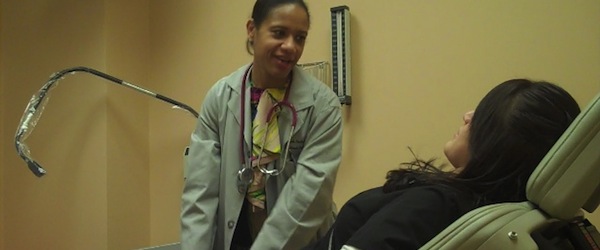
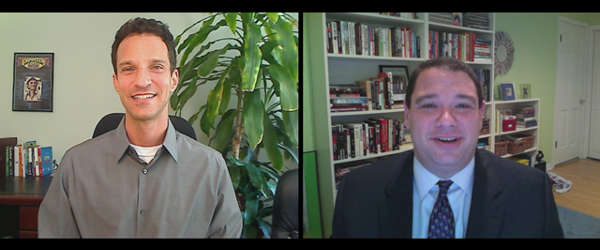
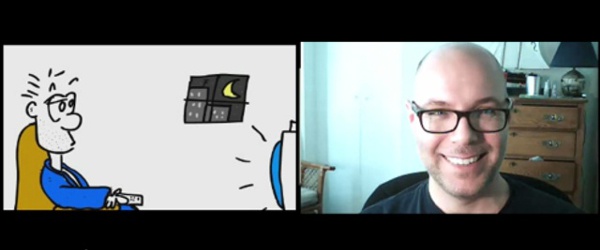
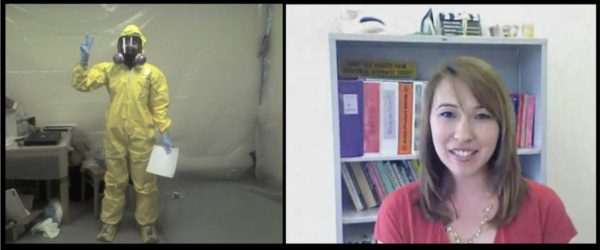
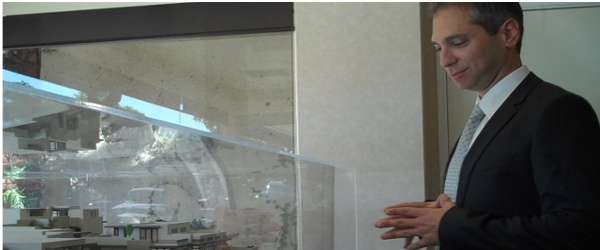

I want to be a paramedic
That’s great! I hope this career video on being a paramedic was helpful to you. Thanks for commenting.
I’ve been looking into being a paramedic and I’ve been liking it more and more as I learn more about it. I’ve already taken first aid and CPR training and although that is easily 10x easier, it was more the satisfaction that I got from knowing that I could do something good that made it so engaging. I’ve always wanted to do something to really help people both physically and mentally and I really believe that this is one of the best ways I can personally do it. I’m not very good at anything in particular but when it comes to crunch time I always seem to pull through and I think that seemed to be one of the most important things you described. This interview was great and has gone a long way in convincing me that where I am looking at as far as careers is the right place.
That’s great to hear, Squeek! Sounds like being a paramedic might be for you. We really appreciate your feedback. Thanks for commenting. And good luck!
I’m in a Technical college, & I’ve been weighing options on what I really want to master in. I would love to become a Coroner or Medical Examiner, but I don’t really want to go to more than 2 years of school. I’m just not that type of learner. I’m not an adrenaline junkie, I’m more of a human body junkie. I’d really like to switch my major to EMT & then go on to be a Paramedic, but I’m not sure it’s right for me.. What else can I do?
Hi Fancy – thanks for your question. I would suggest chatting with someone at your school’s career office if you decide the EMT and paramedic route is not for you. Perhaps you want to look into some type of medical assistant role, nurse’s aide, or even become a phlebotomist. Then of course there are the people operating the equipment at medical offices and hospitals: XRay technicians, MRI technicians, etc. Your school would be better qualified to help answer questions about those paths. Good luck!
this was the best interview of a paramedic paints a good picture of what its like and I feel like the grey areas that I was worried about have been made much more clear now, thanks!
I’m glad it was helpful, Corey. Thanks for taking the time to leave feedback. Much appreciated.
That was a very entertaining and informative video. Thanks for posting this.
Thanks DSligh! Thanks for your feedback.
I’m going to be a Paramedic.
foudn this interview amazing especially when he talked about pay, i looked at those averages and it scared me i had no idea that they include volunteers in those averages.
@02ebdc071468028cf6bca9fb3fa0fb8f:disqus Thanks for sharing your feedback. I’m glad it was helpful! Good luck.
Excellent host and excellent guest in this interview. I have been seriously considering paramedic work, ever since a bad cycling accident (says something about my adrenaline addiction)!
Thank you for creating this video and series.
Hey @disqus_1UIt7OiIUY:disqus – thanks for the great feedback and for taking the time to share.
Thanks to Mr. Grayson, I’d like to dip my toes into this field.
I have been a Paramedic for 10 years now…wow, has it been 10 already?!…and as far as pay is concerned, I apparently live in the wrong area! I have never made more than $38,000 a year with overtime. I live in one of the “fly over states” and I am on a volunteer department and a paid department. I do it for the love of helping people, not the paycheck, but a little more compensation from the paid department wouldn’t hurt my feelings any.
I have read Kelly Grayson’s book, and that is actually why I watched the video when I stumbled upon it while I was enduring part of the 95% tedium waiting for a call. Have a wonderful day everyone!!
That’s great to hear – thanks for posting @d74d2f6d101866b94a4a5141c2a66a8a:disqus!
This sucked I thought I was going to be a perimedic all you did was convince me not to. Dream ruiner
Just want to say thanks for your videos and continual help with career search!
Thanks @Emtwannabe! Comments like yours make it all worthwhile. I’m glad we can be of help.
I’m a junior at Richmond High in Indiana . . At my my school , they offer different vocational classes that we take at our Local Ivy Tech Community College . Ill be a Licensed CNA in January . One of my Counselors at school is trying to get a paramedic/EMT class going .. I watch all these medical drama shows on tv , and being someone who is always on call and is constantly helping people is something I’ve always wanted to do and be a part of . So if they are able to bring the program to my school , I will do anything to grab that opportunity and help save lives 🙂
This is an awesome interview! Very helpful and very honest! I actually plan on now buying his book on Amazon. Canadian EMS luckily pays better than US EMS, but the job is still the same as he explained! I am applying for the primary care paramedic (canadian basic emt) in 2 weeks, before seeing this video… but I am even more excited to attend school and enter the force after watching this!! Thank you for this!!!
That’s great to hear @brittanyjohnson:disqus! Go for it.
So great to hear feedback like that @disqus_c56PaVN1YO:disqus. Thanks for sharing. Interesting to hear about Canada paying better for EMS. It doesn’t surprise me. Enjoy and best of luck!
Very informative, thank you!
Great to hear – thanks for posting, @25b8e0b7e0d5ac4d61d824455c82fee5:disqus!
American medics sound really underpayed. Im in PCP school now and its the most intense work I have ever put into anything. Anyways as a full time pcp where I live i believe its 75,000$ yearly.
This is an excellent video thank you for doing it! This is exactly what I have been looking for. I am currently in the process of beginning my emt education and this video has defiantly helped me gain some confidence and excitement! Paramedics are everyday heros and I can’t wait to help people and save lives.
Interesting. Good to know, @disqus_txUQXSLaDu:disqus.
Great to hear – thanks for the feedback, @Spencer. So glad we could help.
I have been working with patient transports for a hospital, and my bosses are former EMT’s and paramedics and have recommended to me giving being an EMT a shot. It sounds exciting but I want to tackle a tough question. I’m curious how do you handle the disappointment of not being able to save someone’s life when the situation arises? I’ve heard you use sick humor to lighten the mood, but how badly does it bother you and how do you cope with it?